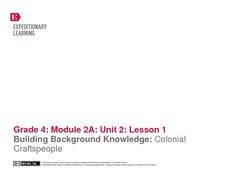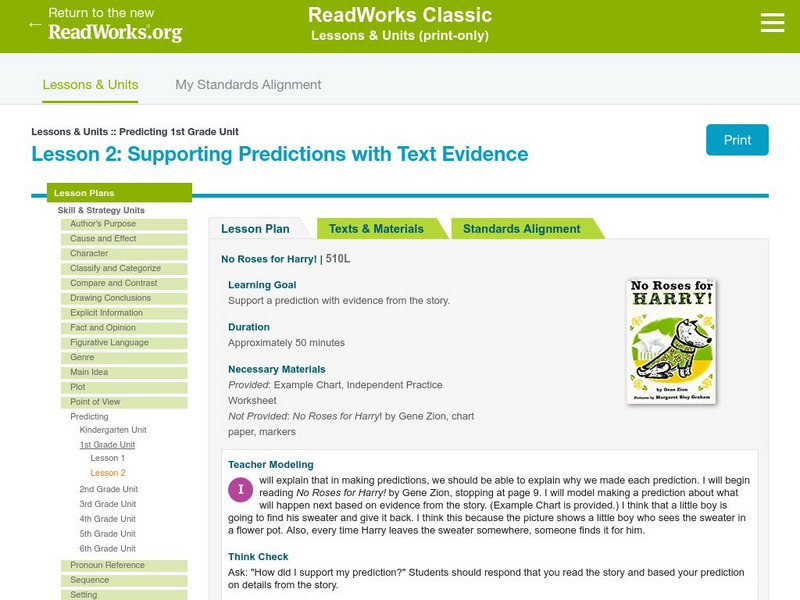EngageNY
Building Background Knowledge: Colonial Craftspeople
In the first lesson plan of this unit on colonial trade, fourth graders gain background knowledge of different jobs performed by early colonists. The class begins with a slide show presentation that includes a variety of great...
EngageNY
Reading and Taking Notes on Colonial Trades
In the tenth instructional activity of this unit, young scholars learn to categorize information as they continue researching their colonial trade. During guided practice, the teacher models how to read informational text slowly while...
Prestwick House
Analyzing Multiple Interpretations of Literature
There is a reason why an Oscar is given each year for the Best Adaptation Screenplay. Adaptations are the focus of an exercise that asks class members to compare a work of literature with a least one adaptation of the work into a...
EngageNY
Documenting Research: Sorting and Recording Information About the Wheelwright
Fourth graders practice using a graphic organizer to record their notes and answer text-dependent questions while supplying evidence of how they found their answer. They focus on a machine called the wheelright, which was commonly...
EngageNY
Listening Closely and Taking Notes: Colonial Trade Podcast About the Wheelwright
Voices from the past. Young scholars listen to a podcast interview with a historical re-enactor as they continue their research in the eleventh instructional activity of this unit on colonial trade. Applying their close reading skills,...
Curated OER
Create College-Ready Readers with Text-Dependent Questions
Build content literacy and cater to the Common Core State Standards by creating text-dependent questions to accompany reading passages.
Austin Independent School District
Visual Discovery Note Taking Sheets
Step into history and step out with a new understanding of events. These strategies bring a new level of understanding of key events by asking viewers to engage in and respond to projected images. Complete directions for the activity, a...
Curated OER
Ban That Book!
Take advantage of Banned Book Week to pique students' interest and get them reading! Create a classroom display of previously banned books and allow each member of your class to choose one to read. After they have read their book, get...
Developing a Global Perspective for Educators
The Lorax - Language
First graders identify text features and how they communicate meaning to the reader. In this media literacy instructional activity, learners view the movie The Lorax and discuss how students from another country would respond to this...
Curated OER
Ship of the Line
Learners discover boats by researching 18th century ships. In this Naval history lesson plan, students identify and describe the different components of an 18th century naval ship after researching information on the Internet....
Curated OER
Using PING to determine factors of Internet delay
Students use the concepts of PING to examine Internet delay. They discuss why PING is used in the Computer Science industry. They practice interpreting data as well.
Other
The Critical Thinking Consortium: A Teacher's Guide to the Gardener [Pdf]
The Gardener by Sarah Stewart won the Caldecott Honor in 1998. It centres around a set of letters about a young girl who moved from the countryside to the city. In the lessons in this teaching guide, students must make inferences from...
Read Works
Read Works: 1st Grade Unit: Supporting Predictions
[Free Registration/Login Required] A lesson utilizing the book No Roses for Harry! by Gene Zionin in which students make a prediction and then support it with details from the text. Ideas for direct teaching, guided practice, and...
Read Works
Read Works: Drawing Conclusions Kindergarten Unit: Short Story
[Free Registration/Login Required] A lesson plan teaching students to make conclusions based on a sentences and short texts. Students use textual cues to explain how the conclusions were reached. Ideas for direct teaching, guided...
Other popular searches
- Teaching Inference Skills
- Teaching Inference Reading
- Teaching Inference Implicit
- Teaching Inference 2nd
- Teaching Inference +Reading











![The Critical Thinking Consortium: A Teacher's Guide to the Gardener [Pdf] Lesson Plan The Critical Thinking Consortium: A Teacher's Guide to the Gardener [Pdf] Lesson Plan](https://d15y2dacu3jp90.cloudfront.net/images/attachment_defaults/resource/large/FPO-knovation.png)

